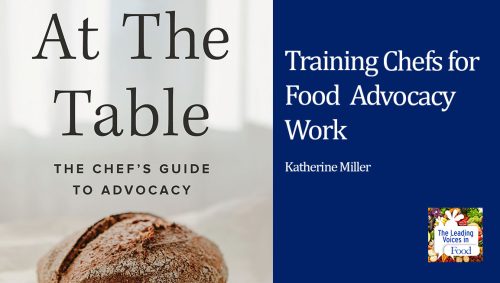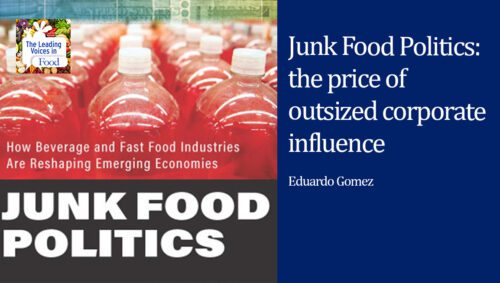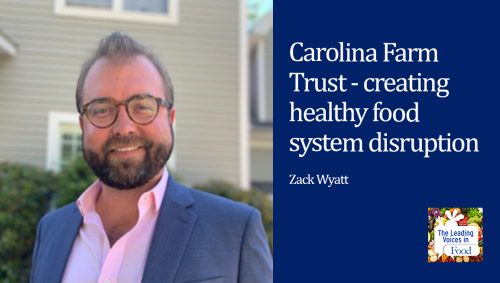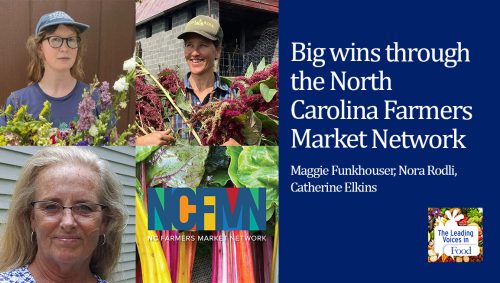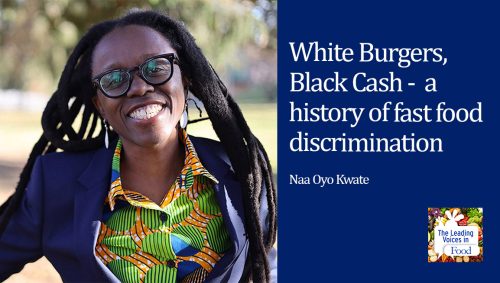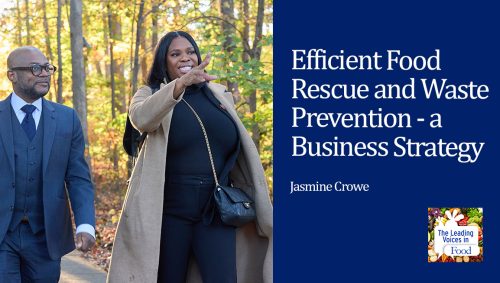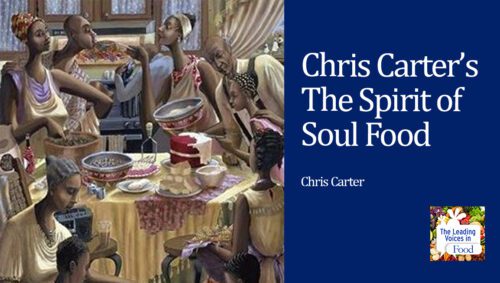The Leading Voices in Food
E175: Striving for Black Food Sovereignty – Stewards for the Land
Today, we’re talking to Dr. Jasmine Ratliff, who goes by Dr. Jas, and is an applied food systems research and policy specialist, and co-executive director of the National Black Food and Justice Alliance. She believes that your zip code should not determine your life expectancy and that building relationships are essential to creating a sustainable and just food system.

Dr. Jas is an applied food systems research and policy-based specialist. She partners with academic research teams, anchor institutions, philanthropic foundations, and community-based organizations to identify root causes of and develop innovative solutions to food system challenges. Dr. Jas received her master’s degree in Community Planning from Auburn University and Ph.D. in Integrative Public Policy and Development from Tuskegee University. As a New Orleans native and farmer, she has developed a unique perspective when it comes to food and the effects that it has on communities. Dr. Jas believes that your zip code should not determine your life expectancy, and building relationships are essential to creating a sustainable and just food system.
Interview Summary
So let’s begin with this. Could you tell our listeners a little bit about The National Black Food and Justice Alliance and some about your work there?
Yes. The National Black Food and Justice Alliance is a coalition of organizations. So we’re not just one organizations. We represent multiple others, about 50 now, and we are committed to building Black leadership and Black food sovereignty.
Those are really important goals, and not easy ones to reach for sure. So let’s dig in a little bit about how you go about doing that. Let’s start with kind of your vision. How do you envision food justice and how do you think about the term food sovereignty?
I work at the Alliance. And at the National Black Food and Justice Alliance, we focus on Black food sovereignty and self-determining food economies, and specifically land justice. And we approach these through a lens of healing and organizing and resistance against anti-Blackness. And all of the work that we do is in pursuit of food justice. So I have a couple definitions. Founding executive director Dara Cooper defined food justice as a process whereby communities most impacted and exploited by our current corporate-controlled, extractive agricultural system shift power to reshape, redefine, and provide indigenous, community-based solutions to accessing and controlling food. And that includes the means to produce food that it is humanizing, fair, healthy, accessible, racially equitable, environmentally sound, and just. That’s how I feel about food justice and it leads us right into food sovereignty. So I know you mentioned it’s an overall long goal, and we borrow this one from La Via Campesina, but food sovereignty is the right for peoples to define their own food and agricultural systems, instead of food being subject to international market forces – as we all know food is so globalized. So sovereignty is absolutely our ultimate goal and it can’t be achieved without confronting actual governance. So we work to ensure that Black people not only have the right, but the ability to control our food.
It really helps to have those definitions. And let’s talk just a little bit more about this. So you talked about decision making, needing to reside in the community where the issues are occurring and you mentioned power transfer. Can you just give us some examples of where the system doesn’t support these kind of things? Like how is the current system not empower people, and how does it strip people of decision making about their own food systems?
Yes! I didn’t actually plan to share this one, but I will. A lot of people refer to your geographic location, and I know in my bio you mentioned this, but your zip code shouldn’t determine your life expectancy. And right now that does. We don’t have the autonomy to create the environment around us. It’s so saturated with capitalism and other things that don’t put people first. So I think food apartheid instead of the food desert reference is a real way that people are disenfranchised and not in power. And that’s also a definition from Dara Cooper, that it’s the systemic destruction of Black self-determination to control our food. This includes land, resource stuff, and discrimination, hypersaturation of destructive foods and predatory marketing in a blatantly discriminatory, corporate-controlled food system that results in our communities suffering from some of the highest rates of heart disease and diabetes of all time. Many, like I said, use the term food desert, but food apartheid is a much more accurate representation of the structural, racialized inequities that are perpetuated through our current system.
Okay, thanks. There’s a lot in there that needs to kind of get disentangled. So let’s talk about some possible advances in solutions. And I know in this context, food co-ops come up a lot. In your mind, how do food co-ops become a tool for not just providing healthy food for communities but also to make movement on racial and economic justice?
Yes, I think co-ops are about collective power. They’re not just a non-extractive way to exchange goods and services, but they’re about the collective buying power, the collective political power, and especially the collective people power. It’s a way that you can actually, in person, in real life, practice democratic governance. And you can create shared principles and values and shared wealth and authority and it’s not concentrated in just the hands of a few, or just the people who are making decisions. And it’s not just an economic sense. I really listen to all our members who are in the process of building of even a retail store, grocery, co-op, and it’s about a political space. It’s more than just groceries. So they’re a pillar of our community. And then especially in the Black community, co-ops have always been built out of necessity. I love Dr. Monica White’s “Freedom Farmers” book, when she describes Fannie Lou Hamer, when it describes food as a political weapon. We know we can control our food systems and the means of production when we create these places of distribution, and we can use them as a tool to build towards freedom. So I’m excited to be doing that work with the Alliance.
Well, it’s exciting to me. And when you talk about food co-ops being more than groceries, let’s explore that a little bit more if you wouldn’t mind. So if you walked into a food co-op, you’d get a picture of things, groceries, but you’re building a picture here that talks a lot more than just those things. So there’s community empowerment, there’s community engagement, there’s wealth creation in the community. But I’m saying these things and you’re the one who really knows them. So tell us a little bit more about what’s there besides the groceries.
Yeah, there is absolutely community. There’s spaces for people to learn together about healthy products. There can be a cooking class attached. When I think about these things, I’m speaking about specific co-ops. One in Dayton, Ohio, Gem City, they have a doula co-op and a health room where maternal health access can be made available. There’s also just the vibe. There’s the music that you hear. There’s the people that you see. It’s like not only providing jobs, but it’s providing living wage jobs that are able to provide upper mobilization. So it’s, like I said, more than groceries. It’s a vibe. It’s community. It’s all the things that you could imagine, but sometimes people outside of the community aren’t able to imagine that. Like investors and things. If there isn’t a grocery store there for the past 50 years, why would someone bring one there now? But when the community knows that this is something that they need and they’re putting their all into it, they’ll build it for 10 to 12 years before they even see a store. So I’m excited to actually go into one of the co-ops in Detroit and they’re groundbreaking this weekend, so I know that they’ll be building it really soon and I can open the doors and be their guest.
So my background is being a researcher and the researcher ordinarily looks at a situation like this and says what kind of outcomes can be measured? And one thing that the researchers might automatically think about would be what are the health outcomes in the community from having healthier diets? But you’re talking about a lot more than that, even intangible things like morale of the community, the engagement, the happiness, and then of course there’s the economic development. So it sounds like there’s an awful lot involved in these efforts, isn’t there?
Absolutely. And organizing them, you never know what you’ll get when you bring the community together. And beautiful things are born especially when they have control. And it’s about participatory budgeting as well and everyone being clear where the funds are going, and it feels good to be a part of something that you can see the effort, the fruits of your labor.
So I’m assuming that your theory on this is that if the solutions for these very significant food problems come from within the community itself, you’re going to get more buy-in, better morale, and ultimately better solutions. Is that correct?
Absolutely, right on.
Let me ask a final question about farmers, because they’re obviously a really important part of this. Could you talk about the institutional and systemic harm that Black farmers and landowners have experienced and how your Alliance is going about addressing this?
I’m sure a lot of people have heard the statistic about the land that Black farmers no longer have control over. We think back into the 1920s when there were nearly 1 million Black farmers in the United States, and now we’re less than 1% of farmers, but more so the land that has been taken away. It’s said to be between more than 15 to 19 million acres. And I say land that’s been taken away because land has never been lost. You can lose your keys. You can’t lose land. It’s been Black communities, systemically disenfranchised, and has been this way for decades. And it’s interesting to see it continue to play out even today with the debt relief for Black farmers, lawsuits that are still going on. The Alliance is supporting that. But more importantly, we’re building an alternative. We’re looking to remove land from the speculative market. We have a goal of 15 million acres to do such where it will be in perpetually hands of Black land stewards to continue to build for Black food sovereignty. So that’s our resource commons, and that is actually democratically governed by seven of our members on our Resource Commons Council. We’re looking to have our first piece of land this year and to continue building and purchasing and removing the land from the speculative market. We are also hosting land stewardship trainings throughout the United States with our members and resourcing them to ensure that we’re not only having land to steward, but also having stewards.


